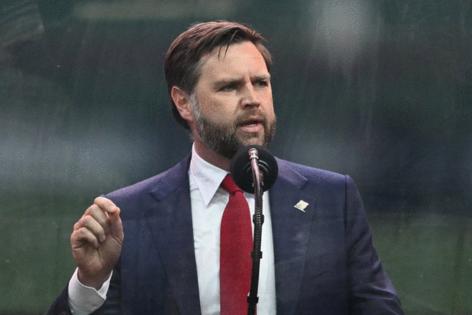United, American CEOs meet Vance as shutdown strains travel
Published in News & Features
U.S. Vice President JD Vance said a prolonged government shutdown would likely snarl travel during the busy holiday period, as the administration seeks to ramp up pressure on Democrats over the funding standoff.
Vance’s comments followed a roundtable at the White House with aviation industry leaders on Thursday.
Attendees included United Airlines Holdings Inc. Chief Executive Officer Scott Kirby, American Airlines Group Inc. CEO Robert Isom, Transportation Secretary Sean Duffy, and former Republican New Hampshire Governor Chris Sununu, who is now chief executive officer of industry trade group Airlines for America.
Vance told reporters “it could be a disaster” if the shutdown extends into the Thanksgiving travel season. Duffy underscored the point, noting that flight disruptions would likely be worse in November because it’s a busier time for air travel than October.
Shares in United fell as much as 3.7% after Kirby told reporters the shutdown was hurting the economy. American Airlines fell 2.1% and Delta Air Lines Inc. dropped 2.7%.
Aviation has become a flashpoint with the government shutdown now near the one-month mark and air travel showing increasing signs of strain from staffing shortages. On Thursday, flights into airports serving Dallas-Fort Worth and Washington were delayed due to staffing shortfalls.
New York’s John F. Kennedy Airport later halted departures just after 8 p.m. local time for 90 minutes citing ATC staffing. It’s the first time the U.S.’s busiest international airport has been impacted by staffing shortfalls.
Senate Democrats have rejected a short-term funding package approved by the GOP-controlled House, insisting Republicans first renew expiring subsidies for Obamacare health insurance.
Duffy warned earlier this week that flight disruptions for travelers will likely worsen as the funding impasse drags on and the administration and congressional Republicans seek to foist the blame for the shutdown on Democrats.
The shutdown has forced more than 13,000 air traffic controllers and 50,000 Transportation Security Administration agents to show up for work without receiving pay. Missed pay days make it harder for many workers to meet basic living expenses, including child care or commuting costs, prompting some to stay home.
The longer shutdowns persist and the more paychecks controllers and TSA agents miss, the more likely those workers are to call out sick, based on patterns from prior shutdowns. Such absences subject passengers to longer wait times for security checkpoints and flight delays.
Air traffic controllers missed their first full paycheck on Tuesday. That same day, Duffy and Nick Daniels, president of the National Air Traffic Controllers Association, held a press conference at New York’s LaGuardia Airport, to highlight workers’ conditions. They said the situation is particularly challenging for controllers still in training and without the income levels of more experienced colleagues.
Airports across the U.S. have already experienced delays resulting from air traffic controller shortages. Normally the percentage of delays caused by staffing shortfalls is about 5%, Duffy has said, but since the shutdown, that number is routinely higher, at times accounting for more than half of late flights.
Even so, data from aviation analytics company Cirium suggests that so far overall percentage of flights departing on time at major U.S. airports is still within normal levels.
Disruptions to air travel helped bring an end to the last government shutdown in 2019. At the time, air traffic controllers at critical facilities in Virginia and Florida called out sick, slowing air travel across the eastern seaboard and triggering a temporary halt to flights into airports in New York, Newark and Philadelphia.
That same day, President Donald Trump agreed to sign a continuing resolution and reopen the government.
____
(With assistance from Lucia Kassai and Danny Lee.)
©2025 Bloomberg L.P. Visit bloomberg.com. Distributed by Tribune Content Agency, LLC.







Comments